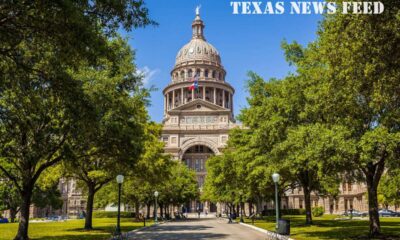Texas News
A property tax deal has eluded Texas lawmakers. Here’s where things stand at the start of another special session.
A property tax deal has eluded Texas lawmakers. Here's where things stand at the start of another special session.
“A property tax deal has eluded Texas lawmakers. Here's where things stand at the start of another special session.” was first published by The Texas Tribune, a nonprofit, nonpartisan media organization that informs Texans — and engages with them — about public policy, politics, government and statewide issues.
Sign up for The Brief, The Texas Tribune's daily newsletter that keeps readers up to speed on the most essential Texas news.
The standoff between Texas' top Republicans over how to make good on promises to cut Texans' property taxes is heading into its third legislative session this year — with no sign of a deal.
After leaders of the House and Senate couldn't come to an agreement in late May over how to deliver property tax cuts, Gov. Greg Abbott immediately called them back to the Capitol to send him a bill in a special legislative session. But lawmakers once again failed to reach a compromise before the clock on that session ran out Tuesday.
On Tuesday, Abbott quickly called a second special legislative session with only one item on the agenda: property tax relief. The session began Tuesday afternoon, though neither chamber was expected to meet before Wednesday, giving lawmakers 30 days to reach a deal on how to use a significant chunk of a record $32.7 billion budget surplus to help lower property tax bills.
Lawmakers face a time crunch to reach a deal on property tax cuts. If legislators agree to a bump in the homestead exemption, which lowers the amount of a home's value that can be taxed to pay for public schools, voters will have to approve that in a constitutional amendment election. The Legislature would have to pass such a deal before a key August deadline in order to get the homestead exemption on the November ballot.
Otherwise, the earliest voters could take up such a measure would be next year.
Here's where they left off:
A battle over who benefits more
The main dividing line between Texas Republicans on how to dole out $12.3 billion in new property tax cuts has been between a proposal that would benefit homeowners and businesses — backed by Abbott and House Speaker Dade Phelan — and one sought by Lt. Gov. Dan Patrick to give greater relief to homeowners.
The tax-cut method Abbott and Phelan favor would take all $12.3 billion and send it to school districts so they can lower their tax rates — which lawmakers routinely call “tax rate compression.” School districts' property taxes make up the biggest chunk of a property tax bill. All Texas landowners would see a trim in their tax bills under the Abbott-Phelan proposal, though businesses and wealthier homeowners would see a greater benefit.
Abbott and House lawmakers drew a hard line in the sand on the proposal. Abbott narrowly tailored his call for a special legislative session in late May so legislators could only adopt a tax-cut proposal that only called for compression. House lawmakers quickly did so on the first day of the special session and then abruptly adjourned — leaving it to the Senate to pass the bill or nothing at all. But the Senate never took up the proposal.
Some conservatives ultimately want to get rid of the chunk of the school property taxes that pay for maintenance and operations — like teacher salaries and schools' operating expenses — altogether and replace those funds with state dollars. Abbott and House lawmakers saw their proposal as a better vehicle than the Senate's proposal to work toward that goal.
Abbott doubled down on the all-compression approach in his latest special session call Tuesday, telling legislators to send him a bill that cuts tax rates “solely by reducing the school district maximum compressed tax rate in order to provide lasting property-tax relief for taxpayers.” He also told lawmakers to pass legislation that puts Texas “on a pathway to eliminating” the M&O tax, which provides funds for school districts' maintenance and operations costs.
But Abbott indicated an openness to other forms of property tax relief should leaders of both chambers strike a bargain.
“Unless and until the House and Senate agree on a different proposal to provide property tax cuts, I will continue to call for lasting property tax cuts through rate reductions and working toward eliminating the school property tax in Texas,” Abbott said in a statement. “Special sessions will continue to focus on only property tax cuts until property tax cut legislation reaches my desk.”
The idea of eliminating what's called the M&O tax has worried public school officials who fear the proposal would lead to spending cuts for public education the next time the economy hits a downturn. Lawmakers also have few long-term options for funding the elimination of M&O taxes. The state doesn't have an income tax and legislators would likely have to significantly raise the state sales tax in order to offset the lost revenue. Patrick has dismissed the notion of axing the M&O tax as a “joke” and a “fantasy” and cited its high potential costs.
Patrick and Senate tax-cut warriors have pushed a package that includes relief specifically for homeowners. Under their proposal, more than two-thirds of the $12.3 billion would still go toward compression. But Patrick also wants 30% to go toward a boost in the state's homestead exemption for school district taxes, or the amount of a home's value that can't be taxed to pay for public schools. Patrick wants to raise the exemption from $40,000 to $100,000.
Homeowners would pay taxes at a lower rate under both proposals, but the Senate tax-cut plan would provide more immediate relief to homeowners compared with the Abbott-House plan. It's upfront relief versus the lofty promise under the Abbott-House plan — that perhaps one day homeowners will no longer have to pay school M&O property taxes — said Lynn Krebs, a research economist at the Texas Real Estate Research Center at Texas A&M University.
“You're not really getting that [elimination] this time around,” Krebs said. “You're just getting the implication that maybe this is the direction we're going and someday we might get there.”
Other ideas on the table
Lawmakers are floating other ideas on how to cut taxes.
Under a new tax-cut package that passed the Senate in late June, senators included a tighter cap on how much school districts' property tax revenue can grow each year — with the hope that restricting that growth will lead to lower tax rates. Lawmakers last tightened that cap in 2019 as part of a broader school finance package that included new state spending on schools, funds for compression and caps on school district tax rates. That year, legislators also approved tighter property tax revenue caps on cities and counties.
Texas taxpayers have paid less than they would have without the caps since those laws passed, according to a study from the business-backed Texas Taxpayers and Research Association. Taxpayers would have paid $6 billion more in 2021 than they would have absent the 2019 tax-cut laws, according to the study.
Restricting the growth of property tax revenue “is a valid and effective way to control property taxes,” said Dale Craymer, a former budget director for former Govs. Ann Richards and George W. Bush who heads the Texas Taxpayers and Research Association.
Business groups and some tax-cut proponents have fretted that boosting the homestead exemption as Patrick wants would shift the burden of paying property taxes onto owners of business properties. To try to assuage some of those concerns, the Senate has pitched an expansion of the state franchise tax exemption, which would exempt 67,000 business owners from paying that tax — a gambit aimed at small business tax relief.
The House is generating its own ideas for property tax cuts. As the Senate advanced its latest tax-cut proposal in the final days of the first special session, Phelan assembled his own House committee to study “sustainable property tax relief.”
One idea floated in late June: limiting the annual growth of individual property tax bills paid to school districts, cities and counties. State Rep. Dustin Burrows, a Lubbock Republican who once headed the House's tax-writing committee, pitched the proposal in the waning days of the special session as a way to “protect property taxpayers from huge spikes from year to year and provide them with a more predictable property tax bill,” he wrote in a June 23 letter.
Just how that idea would work in practice hasn't been ironed out — and a bill to carry the proposal and lay out its mechanics is still being drafted, Burrows said.
Trying to limit the growth of the final tax bill itself is a novel approach for Texas, tax-cut experts said. In recent years, legislators have tried to limit tax bills by restricting overall government revenue growth, paying school districts to lower their tax rates or raising the state's homestead exemption.
Other states have ways of capping property tax bills when they reach a certain level — typically in the form of “circuit breaker” programs, which kick in when tax bills exceed a certain percentage of a taxpayer's income. According to the Lincoln Institute of Land Policy, a Massachusetts-based think tank, some 30 states and the District of Columbia have such programs that give taxpayers a credit or rebate in those instances. Many states use their income tax systems to determine whether taxpayers qualify for a rebate and to issue those refunds. Texas doesn't have an income tax, but other states distribute rebates without using an income tax system.
Tax policy experts were hesitant to analyze the Burrows proposal, citing the relative lack of details. One outcome that's likely, Craymer of TTARA said, is local governments and school districts would see “substantially” less tax revenue under such a proposal.
Disclosure: Texas A&M University and Texas Taxpayers and Research Association have been financial supporters of The Texas Tribune, a nonprofit, nonpartisan news organization that is funded in part by donations from members, foundations and corporate sponsors. Financial supporters play no role in the Tribune's journalism. Find a complete list of them here.
Go behind the headlines with newly announced speakers at the 2023 Texas Tribune Festival, in downtown Austin from Sept. 21-23. Join them to get their take on what's next for Texas and the nation.
This article originally appeared in The Texas Tribune at https://www.texastribune.org/2023/06/28/texas-property-tax-cuts-legislature/.
The Texas Tribune is a member-supported, nonpartisan newsroom informing and engaging Texans on state politics and policy. Learn more at texastribune.org.
Did you miss our previous article…
https://www.galvestontrendingnews.com/?p=3698
Texas News
Rudy Giuliani disbarred over ‘false and misleading’ statements on 2020 election
SUMMARY: Rudy Giuliani has been disbarred by the Appellate Division First Department in New York, a consequence of his false and misleading statements related to former President Donald Trump's 2020 reelection efforts. Giuliani claimed he believed his statements at the time, but the court was unconvinced, arguing he should have known better. The ruling emphasizes the seriousness of his misconduct and its contribution to national strife post-election. Giuliani and several Trump allies pleaded not guilty in Arizona for efforts to overturn the election results, and he agreed to cease election fraud allegations against two Georgia workers after losing a defamation case.
The post Rudy Giuliani disbarred over ‘false and misleading' statements on 2020 election appeared first on abc13.com
Texas News
Where and when are lightning deaths most common?
SUMMARY: Since 2006, almost 500 people have been killed by lightning strikes in the U.S., according to the National Lightning Safety Council. Florida has the highest number of fatalities with 90, followed by Texas with 40. Wyoming has the highest fatality rate per million people. Men constitute 80% of these deaths. Activities like fishing, beaching, boating, and camping are most associated with lightning fatalities. People in their 20s make up 20% of the deaths, while children under 10 account for 12 deaths since 2006. Fatal strikes peak in July, and Saturdays report the most fatalities, with a 1 in 1,509,000 chance of being struck annually.
The post Where and when are lightning deaths most common? appeared first on www.kxan.com
Texas News
Fourth of July 2024: What stores and restaurants are open and closed
SUMMARY: ABC Digital Team’s article outlines essential details for the Fourth of July. The piece covers which restaurants and retail stores will be open or closed on the holiday, with notable mentions including Applebee’s, McDonald’s, Target, and Walmart. It also highlights potential reduced hours for some stores like Aldi and CVS. Additionally, FedEx and UPS will have limited services, while USPS will be closed. The article includes a related link explaining the history of celebrating July 4th with fireworks and provides planning tips for those looking to travel or shop on Independence Day.
The post Fourth of July 2024: What stores and restaurants are open and closed appeared first on abc13.com
-
Texas News7 days ago
Police identify woman found dead in southeast Austin abandoned home
-
Texas News7 days ago
Harris County District Judge Kelli Johnson arrested on DWI charge after traffic stop in April ended in warning, court records say
-
Texas News5 hours ago
I-10 westbound from Beaumont to Houston reopens day after large crack prompted closure at Washington Boulevard
-
The Center Square7 days ago
Texas again ranks as top state for best business climate | Texas
-
Kaiser Health News7 days ago
Los Angeles County Approves Medical Debt Relief for Residents
-
Videos7 days ago
FOX 7 Español – 6/25/24 Titulares | FOX 7 Austin
-
Videos7 days ago
Dallas Black Chamber of Commerce giving out $30,000 in grants to minority-owned businesses
-
Texas News6 days ago
Entire Hells Angels chapter arrested in California in kidnapping and assault probe, police say – NBC 5 Dallas-Fort Worth







































